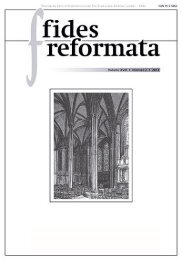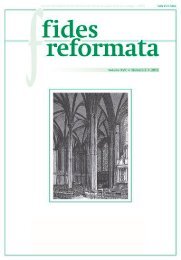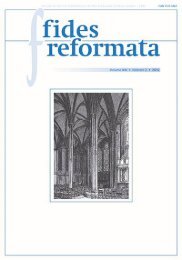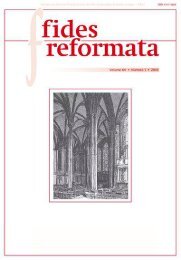You also want an ePaper? Increase the reach of your titles
YUMPU automatically turns print PDFs into web optimized ePapers that Google loves.
Breno Mace<strong>do</strong>, Covenant Theology in the Thought of John Calvin<br />
to God and to teach him subjection. “A law is imposed upon him in token of<br />
his subjection… Therefore, the prohibition of one tree was a test of obedience.”<br />
Being successful in his test, Adam would enjoy a blessed state yet unknown<br />
to him. “His earthly life truly would have been temporal; yet he would have<br />
passed into heaven without death, and without injury.” 7 “Truly the first man<br />
would have passed to a better life, had he remained upright; but there would<br />
have been no separation of the soul from the body, no corruption, no kind of<br />
destruction, and, in short, no violent change.” 8 Calvin understands, therefore,<br />
that the relationship between God and Adam is a sort of probation based on<br />
man’s obedience. 9 This, in spite of the absence of the word “covenant”, is a<br />
fundamental element in the <strong>do</strong>ctrine of the covenant of works. 10 Paul Helm<br />
rightly affirms: “Calvin teaches that the relation of Adam to his creator was<br />
that of a probationer.” 11<br />
It is important to note that, for Calvin, the condition imposed upon Adam<br />
was a legal arrangement. The reformer refers to the condition of Adam’s probation<br />
as “a law”. But it would be wrong to limit the definition of law in Calvin’s<br />
theology to the single command of abstinence of the forbidden fruit without<br />
considering Calvin’s writings as a whole. In his commentary of Leviticus 18:5,<br />
Calvin recognizes the salvific power of the Law of Moses (the moral law)<br />
although “salvation is not to be expected from the Law unless its precepts be<br />
in every respect complied with.” 12 After the Fall, the law continues to provide<br />
life to all those who can perfectly obey it. 13<br />
In other words, Calvin sees continuity between Eden and Sinai. In both<br />
circumstances life was promised and death was threatened under the same<br />
condition: perfect obedience to the Law. The Edenic single condition of perfect<br />
7 Calvin, Commentaries on Genesis, 1:127.<br />
8 Ibid., 1:180.<br />
9 Calvin expressed the same view of a probationary relationship between God and Adam in his<br />
Institutes. There, one finds him affirming: “But the promise by which he was biden to hope for eternal<br />
life, and, conversely, the terrible threat of death once he tasted of the tree of the knowledge of good and<br />
evil, served to prove and exercise his faith.” Jean Calvin, Institutes of the Christian Religion, ed. John T.<br />
McNeill, trans. Ford Lewis Battles, v. 1 (Louisville, KY: Westminster John Knox Press, 1960), 245, II.I.4.<br />
10 Westminster Confession of Faith, Chapter 7, Section 2.<br />
11 Paul Helm, “Calvin and the Covenant: Unity and Continuity,” Evangelical Quarterly 55 (April<br />
1983): 74.<br />
12 John Calvin, Commentaries on the Four last Books of Moses Arranged in the Form of a Harmony,<br />
trans. Charles William Bingham, vol. 2 (Grand Rapids, MI: Baker Book House, <strong>20</strong>05), <strong>20</strong>4.<br />
13 “…he [Moses] considers the Law as connected with promises and threatening. Whence it follows,<br />
that salvation can only be procured by it if its precepts be exactly fulfilled. Life is indeed promised in<br />
it, but only if whatever its commands be complied with; whilst, on the other hand, it denounces death<br />
against its transgressors, so that to have offended in the slightest point is enough to condemn and destroy<br />
a person; and thus it overwhelms all men with despair.” Calvin, Commentaries on the Four last Books<br />
of Moses, 2:<strong>20</strong>0.<br />
92

















